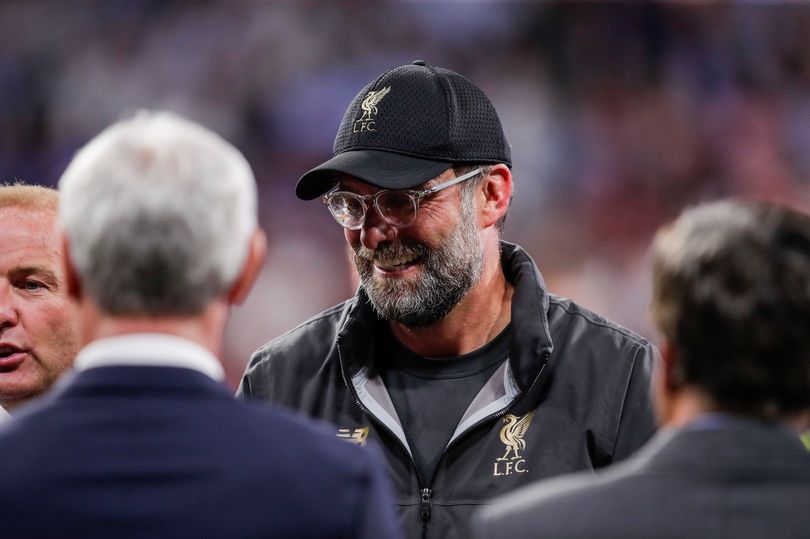At first glance, it was not immediately obvious that Jurgen Klopp had in fact come off second best on the night.
As the Liverpool manager was caught on camera bellowing in the kitchen of his Merseyside home at 5am, just hours after the 2018 Champions League final, it would not have been clear to those who hadn’t seen the game that the Reds had come up short against Real Madrid.
But rather than wallow in a cruel and frankly bizarre night at the NSC Olimpiyskiy – where 44-goal top scorer Mohamed Salah’s evening was cut short by Sergio Ramos’s skullduggery and Loris Karius endured the worst night of his life – Klopp was in no mood to be despondent about his own fortunes. Instead, as he sang along with Campino, lead singer of German band Die Toten Hosen, the Liverpool boss was defiant. He knew he and his team would be back.
“We saw the European Cup. Madrid had all the f****** luck. We swear we’ll keep on being cool, we’ll bring it back to Liverpool!”
Liverpool manager Jurgen Klopp salutes the supporters following the Premier League match at Aston Villa on May 13 2024
Liverpool missing five players as Jurgen Klopp faces difficult farewell decision
They were lyrics that would prove prophetic; barely a year later, Klopp’s team were champions of Europe. How they got there centred largely around a proactive and aggressive few post-Kiev weeks, where Liverpool fine-tuned their squad to take them from contenders to champions.
The final whistle had barely sounded in the final itself when Liverpool moved to bring in Fabinho from Monaco in a £40m deal before Naby Keita arrived, a year later than anticipated, for a £52m figure. Klopp had initially planned to keep faith with Karius but more errors in pre-season convinced all that a fresh start was needed. The club broke the world-record fee for a goalkeeper to sign Alisson Becker from Roma in July for £65m and £12m Xherdan Shaqiri from Stoke City. Suddenly, a new-look squad that had signed Virgil van Dijk just a few months earlier was ready to compete.
A 4-0 smiting of West Ham United on the opening weekend was cause for optimism before professional victories at Crystal Palace and at home to Brighton furthered the feelgood factor. Six straight wins and a draw at Chelsea kept the Reds around the top of the table while the Champions League campaign got underway with a 3-2 triumph against Paris Saint-Germain at Anfield, which is, six years on, one of the forgotten gems of Klopp’s time.
Defeats in all three away days in the group stages, however, had Champions League hopes hanging by a string by the time Napoli visited Anfield in December. Mohamed Salah’s goal was the difference but the match is perhaps best remembered for a stunning save from Alisson to thwart Arkadisuz Millik from levelling late on and eliminating the Reds all together.
If Steven Gerrard’s thunderbolt against Olympiakos in 2004 was the sliding doors moment for a side who would go on to lift the European Cup in May 2005, Alisson’s save was its 2018 equivalent. Without the Brazilian’s late intervention, there would be no Madrid, no sixth European Cup or the feelgood factor that emboldened the squad to end a 30-year wait for a domestic league title the following year. Put in those terms, it’s difficult to overstate the save’s importance.
A 3-1 win over Manchester United later that week was thoroughly deserved and it was a result that saw Jose Mourinho subsequently given his marching orders at Old Trafford. Victories for Klopp’s Reds followed against Wolves, Newcastle and Arsenal as the Reds navigated the notorious festive period with aplomb. The 5-1 battering of Arsenal was particularly electric.
If the aforementioned Alisson save was a seismic moment for Liverpool’s modern history, an incident in the first game of 2019 would prove just as pivotal on the opposite end of the scale when Klopp’s men were entertained by Manchester City at the Etihad.
Just 11mm was all that kept Liverpool from scoring before John Stones’s clearance of a ball that was seemingly rolling through a line made of extra-thick treacle. A 2-1 defeat at the Etihad as a result was Liverpool’s only loss of the campaign. Just 11mm was all that stopped the Reds from an unbeaten campaign that, had literally nothing else changed that season, would have seen Klopp’s men go down as Premier League and Champions League-winning Invincibles.




















